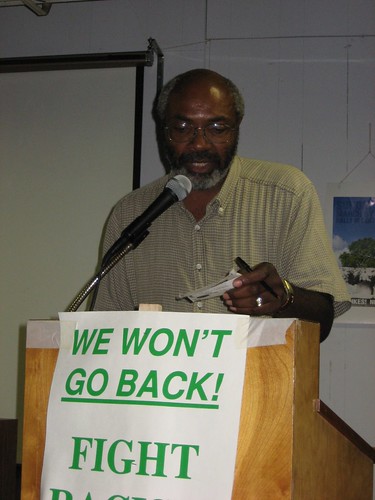
Abayomi Azikiwe, editor of the Pan-African News Wire, delivering an address on the prison industrial complex on Saturday, August 25, 2007. (Photo: Cheryl LaBash)., a photo by Pan-African News Wire File Photos on Flickr.
French Military Intervention in Mali Escalates Regional Tensions
Algerian gas field stormed by military forces leaving many dead
By Abayomi Azikiwe
Editor, Pan-African News Wire
France has escalated its military intervention into the West African state of Mali with increased bombing operations in the north, central and east of the country and the deployment of additional troops. Paris says that it will soon have over 2,000 military personnel occupying Mali.
Meanwhile in neighboring Algeria, a group of armed combatants took control of the In Amenas gas field partially operated by BP Corporation and Statoil, which is owned by interests in Norway. Hundreds of Algerian nationals and foreign personnel were taken into custody by the group, which reports say were Islamists associated with the “Battalion of Blood” led by Abu al-Baraa.
Untold numbers of people were killed during the raid carried out by the Special Forces units of the People’s National Army of Algeria (ANP). Nearly 600 of the Algerian workers were released from the facility on January 17, while several foreigners employed at the field from Belgium, the United States, Japan and Britain also survived the detention and apparent rescue mission.
Early reports indicated that approximately 50 people died in the ANP raid on the facility in an attempt to end the stand-off and free the detainees. However, these figures could not be independently verified in the immediate aftermath of the military operation.
According to Reuters, “Thirty hostages and at least 11 Islamist militants were killed…. Two Japanese, two Britons and a French national were among at least seven foreigners killed.” (January 17)
The same article goes on saying “Eight of the dead hostages were Algerian. The nationalities of the rest, as well as of perhaps dozens more who escaped, were unclear. “
Algerian military forces were engaged in the operation at In Amenas for eight hours after the government refused to grant a demand that the group be allowed to leave the country with those detained. The bodies of Egyptians, Tunisians, Libyans and at least one Malian and a Frenchmen were reportedly found at the scene of the firefight.
United Nations Security Council and the European Foreign Ministers Support Occupation
The French government went before the UN Security Council on January 14 and won approval for its operations in Mali. The 15-nation Council conveyed “understanding and support” for the bombing and invasion.
On January 17, Europe’s foreign ministers approved the deployment of troops purportedly to help train Malian forces to fight against the Islamist groups in the north and central regions of the vast country. Although the foreign ministers claimed that their respective states outside of France would not participate in the ground operations, they noted that this position may soon change.
Foreign Minister Laurent Fabius of France said in the aftermath of the European decision that “It is possible but it remains the responsibility of the other countries involved whether they decide not only provide logistical support, but also to provide combat troops. But we cannot force them to do it.” (euronews.com, January 17)
The western-backed government in Mali through its Foreign Minister Tieman Hubert Coulibaly praised the decision by the European states. He stressed that “All European countries today declared their support, not only for the action taken by the French Foreign Minister, but also for what we are doing on the ground.
The meeting of the European ministers indicated that the support mission for the French military bombing and ground invasion would last for fifteen months. The cost has been estimated at 12 million euros for the involvement of the allied European military forces.
French fighter jets bombed Douentza, some 500 miles from the capital of Bamako on January 15. The Islamists had held the town since September.
In addition, the cities of Timbuktu and Gao were also struck by Rafale war planes killing many people and forcing thousands to flee the surrounding areas.
Later a spokesman for the Ansar Dine (Defenders of the Faith) group, Senda Ould Boumama, stated that they had withdrawn from the main cities and towns in the north of the country as a “tactical retreat” aimed at minimizing civilian injuries and deaths. A leader of the Movement for Oneness and Jihad in West Africa (MUJAO), Abou Dardar, stressed that “France has attacked Islam. We will strike at the heart of France.” (naharnet.com, January 15)
Opposition Grows to French Imperialist Intervention
The World Federation of Trade Unions (WFTU) has issued a statement opposing the intervention in Mali by Paris. The Secretariat of the international organization blasted the bombing and invasion saying “After the genocide in Rwanda and the demolition of Libya, France continues to use the military bases it maintains in Africa in order to strengthen its role in the inter-imperialist competition and to serve the interests of its monopoly groups who are plundering the wealth-producing resources (gold, uranium, etc.)” (January 15)
Also the Workers’ Party of Belgium denounced Brussels involvement in the Malian invasion saying that “France’s intervention is of course not devoid of self-interest. As the former colonial power, France continues to have huge economic interests in the region.”
The statement continues noting “Mali possesses gold mines and petroleum, while also uranium is extracted in the region, which is used for part of the French nuclear industry. Just like with the deadly NATO bombing on Libya two years ago, Belgium has been very quick to offer its participation to the French military intervention. And this is taking place without any democratic debate about its objectives, consequences or cost. In a period of painful austerity measures and cuts in the social budgets, any increase in the Defense budget is simply cynical.” (January 16)
No comments:
Post a Comment